Vitalization strategy aims to bolster development and provide jobs
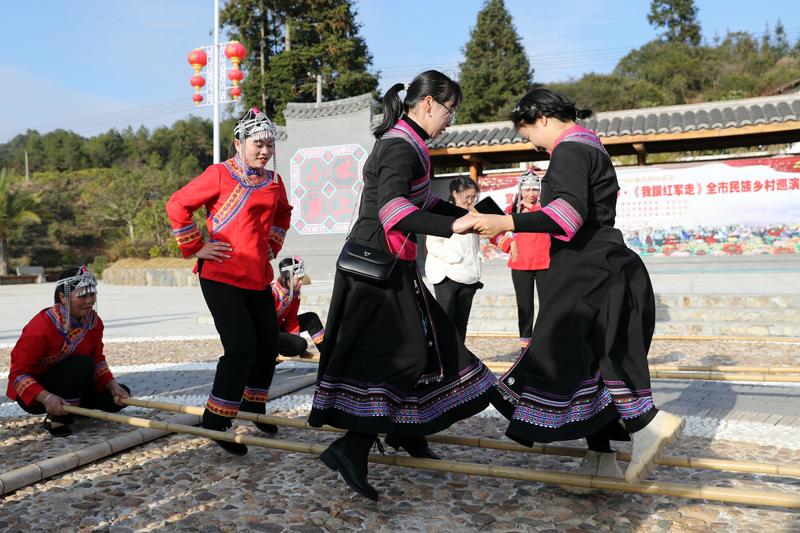 Villagers from the She ethnic group dance with visitors in Dongtou township, Huichang, Jiangxi province, as they avoid getting caught by bamboo poles. (WANG ZHUANGFEI / CHINA DAILY)
Villagers from the She ethnic group dance with visitors in Dongtou township, Huichang, Jiangxi province, as they avoid getting caught by bamboo poles. (WANG ZHUANGFEI / CHINA DAILY)
Xiong Guixiu, a 46-year-old businesswoman, decided to steer fellow villagers and peers toward a better life while she was growing up in an outlying area in Huichang, a once poverty-stricken county in Jiangxi province.
"I left my village and worked in Nanchang, the provincial capital, when I was about 16. I experienced both hardship and success in the city, and later in Henan province, where I also have a branch of my company," she said.
Xiong said that in Nanchang, her company focuses on agricultural consultancy and ecological construction projects.
"I was brought up in Dongtou township, and when I was striving for a better life in Nanchang, I always dreamed of home-the beautiful mountains, clean water and the warmhearted villagers," she said.
When she decided to return home, Xiong said she benefited from the county government's policies and strong backing.
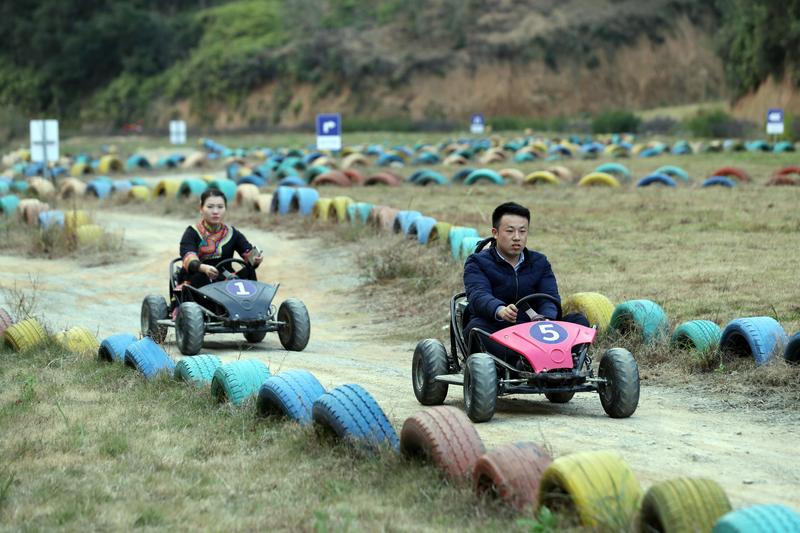 Visitors enjoy go-kart racing at a tourist attraction in Shezu village, Huichang, Jiangxi. (WANG ZHUANGFEI / CHINA DAILY)
Visitors enjoy go-kart racing at a tourist attraction in Shezu village, Huichang, Jiangxi. (WANG ZHUANGFEI / CHINA DAILY)
"In 2019, I proposed launching an ecological agriculture business, which requires a relatively large area of land. Thankfully, local officials gave me really good support and accompanied me to choose the land.
"I then decided to settle my company in Dongtou, where I grew up. To date, I've invested about 70 million yuan ($11 million) in the company to develop ecological agriculture," she said.
Xiong said she was driven to invest in the village not only through a love for her hometown, but also because she had full confidence in the nation's policy of vitalizing rural areas in the near future.
Initiated by President Xi Jinping in October 2017, the rural vitalization strategy has been highly emphasized.
On Feb 21, the Central Committee of the Communist Party of China and the State Council, the nation's Cabinet, released a guideline to advance implementation of the strategy.
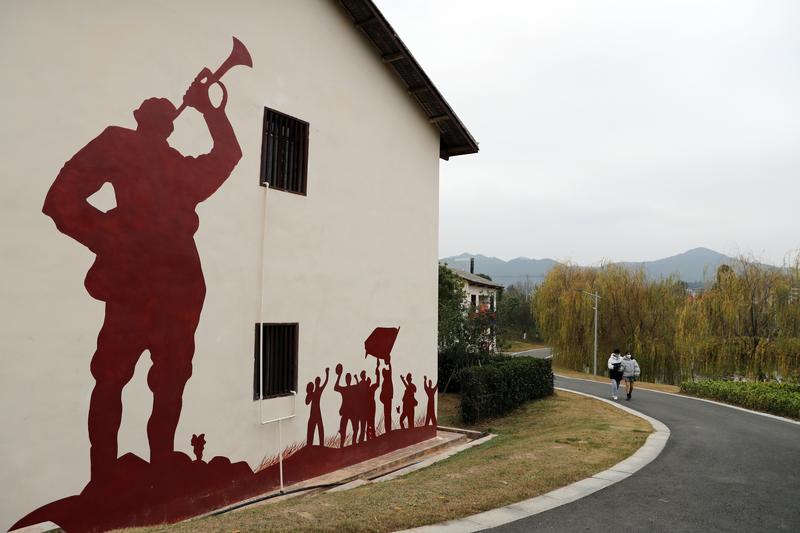 Artwork with a revolutionary theme adorns the wall of a building in Dongtou. (WANG ZHUANGFEI / CHINA DAILY)
Artwork with a revolutionary theme adorns the wall of a building in Dongtou. (WANG ZHUANGFEI / CHINA DAILY)
Development of rural areas and their vitalization are a priority for the government's work during the 14th Five-Year Plan (2021-25) period.
In Jiangxi, development of such areas is highlighted in the province's own 14th Five-Year Plan, which was released in February and is based on the local situation.
The Jiangxi plan will continue to improve the industrial structure of agriculture by making it more modern and improving quality. The plan states that by 2025, the production value of four major categories-rice; fruit, vegetables and tea; livestock husbandry; and aquaculture-will each total more than 120 billion yuan.
The plan will support the construction of some 200 agricultural bases by 2025, which will produce organic food and also channel more resources to develop leisure agriculture to increase the industry's added value.
Xiong, the businesswoman, said she is applying to have her produce certified as organic.
"The environment here and the produce grown by local farmers are of good quality, but a well-regulated company is needed to help farmers plan for and apply such certification. This will help greatly in improving their incomes," she said.
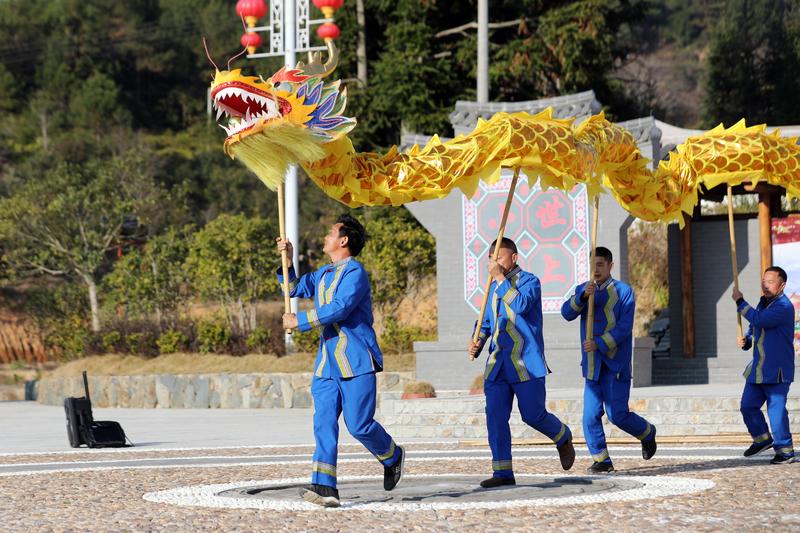 Villagers from the She ethnic group perform a dragon dance. (WANG ZHUANGFEI / CHINA DAILY)
Villagers from the She ethnic group perform a dragon dance. (WANG ZHUANGFEI / CHINA DAILY)
Tourism attraction
Dongtou town is also home to members of the She ethnic group, who bring an exotic touch to the area-making it not only a location for high-quality produce, but also a tourist attraction.
Liu Shiyang, Dongtou township head, said: "The pollution-free environment and high forest coverage of about 88 percent provide good conditions for planting organic produce. We now have specialties such as furong plums, organic rice and Ganoderma (a genus of fungi renowned for their medicinal and pharmacological properties).
"Also, nearly 95 percent of the town's residents-more than 1,800 of them-are from the She ethnic group. Their folk customs, which date back 1,700 years, and costumes make Dongtou a tourist attraction."
Liu said that in 2019, Dongtou was listed as a key township for the rural vitalization strategy, and to date it has received more than 100 million yuan from the county government.
According to a release from the Huichang county authorities, Dongtou has welcomed more than 59,000 travelers since 2019. The town's revenue in 2020 rose year-on-year by more than 22 percent, reaching nearly 36 million yuan.
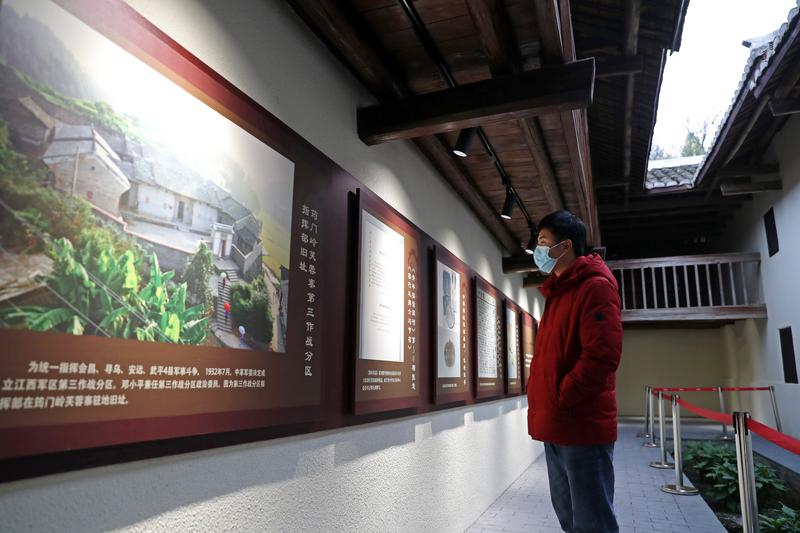 A visitor tours an exhibition featuring revolutionary history in the early 1930s in Huichang, Jiangxi. The venue housed the local Party committee at the time. (WANG ZHUANGFEI / CHINA DAILY)
A visitor tours an exhibition featuring revolutionary history in the early 1930s in Huichang, Jiangxi. The venue housed the local Party committee at the time. (WANG ZHUANGFEI / CHINA DAILY)
Liu Xiufeng, Dongtou's Party secretary, said continuous efforts would be made to create a friendlier environment to attract investors in the near future, in turn promoting employment for local residents.
"For example, a factory processing dried bamboo shoots is being built in Shezu village, with investment of 8 million yuan so far. We are also planning to build homestays highlighting She culture, along with a commercial street in Shezu so that travelers spend more time there and boost the tourism-related economy," he added.
Liu Xiufeng said Dongtou town is also promoting the She ethnic group's culture, such as dragon dancing, by liaising with Shezu village and schools in the town.
"Culture is another important part of vitalizing the village. We have the resources, so why not promote it?" Liu Xiufeng said. He added that the town has allocated about 200,000 yuan for this promotion campaign since 2019, providing students at the local primary school with one dragon dancing lesson a week.
Although he is bullish about Dongtou's future, Liu Shiyang, the township head, still has concerns about its comprehensive development.
"The people have just shaken off poverty (in 2019), but their finances are still unstable. We face challenges in continuously improving their living conditions," he said. "Also, there is still no system for managing the town's produce."
Liu Shiyang said that there are plans to help farmers in Shezu and others in the town become vendors at tourist attractions to increase their sources of income. "We will build a trading center in the town to encourage more farmers and residents from the village to land jobs there," he added.
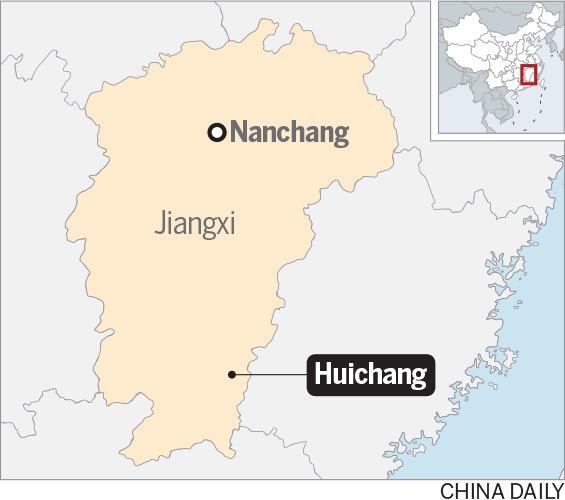
Young blood
Liu Xiufeng said that to vitalize the village and the township, talent is also vitally important in addition to education and cultural prosperity. He said it is good that more young people are returning to the rural area to make a contribution.
Lan Deyong, 33, is among those who returned to Dongtou in 2018, and is now working for the Shezu village committee.
"I used to work for an electronics business in Huizhou, Guangdong province. I feel really happy that I've come back," he said. "This is where I grew up, and I know the people here. Everyone greets me, which makes me feel warm. I reunite with my family members during festivals and holidays, which gives me a sense of stability.
"It's an honor for relatively young people to grow with the village and witness it improve through our contributions."
Zhang Hui, 23, who comes from Huichang, was elected as the representative to the county people's congress in September 2020, thanks to her hard work as a guide at the Hanxianyan tourist attraction since 2017.
"I never feel inferior to my peers who work in big cities such as Nanchang. Working as a guide gives me a sense of achievement and I can also take care of my family members in the county," she said.
Zhang added that over the past few years she has witnessed the county's rapid economic and tourism growth.
"For example, most of the guides I used to know at my company worked part time, as they had jobs as primary school teachers, but now we have more full-time guides. I think this is one of the good changes to emerge from the national policy," she said.


